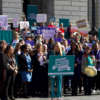Colorado lawmakers have a surprise pot of extra tax money, and Republicans are proposing to use it both for a tax cut and to fix roads. Double spending.
The GOP bill to fix roads, through bonding, would cost about $350 million.
But Republicans are also saying, correctly, that the $200 million in new state revenue, which mostly came from changes in federal tax law, is actually a tax increase.
Republicans, led by State Sen. Jerry Sonnenberg of Sterling are so angry about Trump’s sneaky (an inadvertent) tax increase, triggered by the tax-cut law, that they want to return the money to taxpayers, via a $360 million state income tax cut, which would eclipse the surplus taxes at least for next year.
Another bill proposed by state Rep. Patrick Neville (R-Colorado Springs) and State Sen. Tim Neville (R-Littleton) would cut state income tax even more, by $1.1 billion next year.
So, if both their transportation and income-tax bills passed, the GOP proposal to fix roads would have to rely on budget cuts, as it did last year, which they have yet to identify–though RTD’s puny BUSTANG bus service would likely be included on their hit list.
As an aside, the GOP’s proposed income tax deduction, in response to the tax increase, permanently lowers taxes, taking $350 million away from state budget priorities, like transportation, health care, higher ed, etc., into perpetuity.
This story starts with House minority leader Patrick Neville’s promise back in December to spend “new revenue” on roads.
“Roads are our top priority,” he said in a December statement, “and there is no reason why nearly all of this new revenue should not go to widening highways and expanding primary arteries. I have heard the governor and Democrat leadership say they agree roads are their top priority as well. With all this new revenue for the upcoming budget, it’s time to see if they are willing to walk-the-walk, so that we can relieve our citizens of congestion and truly unleash our economy.”
Republican Senate President Kevin Grantham made much the same argument on the opening day of the legislative session:
“I’m still willing to sit down and talk to [Democrats], but when you have a gift (the expected revenue surplus) all packaged up for ya that is the $100 million, $200 million, whatever, not counting the potential savings coming in from the Washington, D.C., tax cuts and the surplus we might see from that, if it doesn’t happen now under these circumstances, then when?” Grantham told fellow lawmakers at the state Capitol.
So then what happened?
State Sen. Randy Baumgardner (R-Hot Sulphur Springs), former chair of the transportation committee, introduced the GOP’s marquis bill of the session, Senate bill number one, which calls for spending about $350 million to leverage $9 billion for Colorado roads.
Then, Sonnenberg and Grantham introduced their bill to cut income taxes by $360 million, and the Nevilles lobbed in their $1.1 billion version–in response to the estimated $200 million in revenue from the tax increase triggered by Trump, which some believe could turn out to be higher in the future, but others say it could be much lower.
And the closest thing to a concrete GOP proposal to cut the state budget to pay for its transportation bonds, in the absence of a tax increase, is a vague across-the-board 2 percent budget cut, which Republicans say would free up $430 million for transportation.
Colorado Politics reporter Marianne Goodland reported what’s known about this last month:
Sonnenberg said recently 2 percent cut would be a savings of $433 million, but Democrats counter that across-the-board cuts would impact social service programs to families and veterans. Eventually, Sonnenberg explained, “you either give it back now or when we hit the TABOR cap” it will go back in the form of income tax refunds. State economists have not yet calculated when that would happen.
Democrats say the state budget is already too tightly squeezed to make such cuts.
Last year, a bipartisan bill to raise about $450 million annually for transportation, via a sales tax, died. This year, the Denver Metro Chamber of Commerce is floating a proposal to raise transportation funds, also via a sales tax, but as an initiative.
While Republicans want to cordon off tax money for transportation, Democrats, including Hickenlooper, are proposing to spend increased revenue on a rainy-day fund, for an eventual recession, and other priorities.



